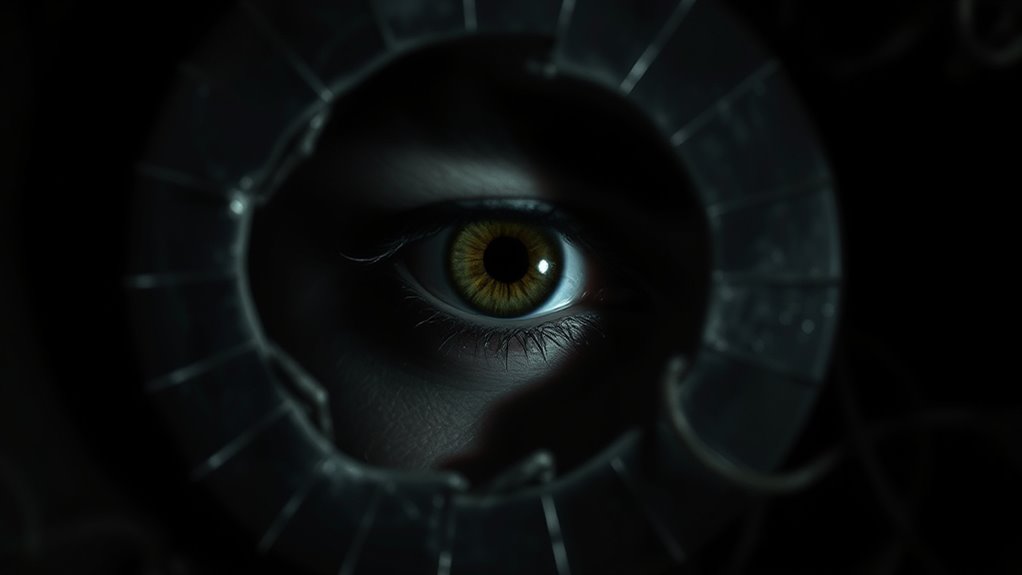The Dark Triad—narcissism, Machiavellianism, and psychopathy—are often associated with manipulative or cold behaviors, but extreme forms of these traits are quite rare. Most people show only mild traits without major consequences. These traits exist on a spectrum, so not everyone with occasional narcissistic or Machiavellian tendencies is harmful. Understanding this can help you better spot subtle signs of manipulation or selfishness, and there’s more to uncover if you want to know how uncommon extreme traits really are.
Key Takeaways
- The Dark Triad includes narcissism, Machiavellianism, and psychopathy, each with distinct traits like manipulation and lack of empathy.
- Extreme forms of these traits are rare; most individuals exhibit only mild, non-harmful tendencies.
- Traits exist on a spectrum, with many people displaying minor traits without negative consequences.
- Recognizing these traits helps prevent manipulation and manage personal and professional relationships effectively.
- Popular culture often overstates their prevalence; genuine extreme Dark Triad traits are uncommon in the general population.

Have you ever wondered what drives some of the most manipulative and ruthless behaviors in people? It’s a question that often leads to the concept of the Dark Triad—comprising narcissism, Machiavellianism, and psychopathy. These are personality traits that, when present in extreme forms, can produce behaviors seen as cold, calculating, or even destructive. The thing is, not everyone with these traits behaves badly all the time, but understanding what these traits are can shed light on why some individuals act in ways that seem devoid of empathy or morality. These traits have distinct psychological impacts, influencing how someone interacts with others and perceives the world around them. Recognizing these traits in yourself or others can be vital for *orchestrating* relationships, whether personal or professional, and understanding the potential risks involved.
Narcissism, one component of the Dark Triad, involves an inflated sense of self-importance and a deep need for admiration. When someone exhibits high levels of narcissistic traits, they often prioritize their own needs above others’, which can lead to manipulative behaviors or exploitation. Machiavellianism, on the other hand, is characterized by strategic manipulation, deceit, and a focus on personal gain at any cost. People with strong Machiavellian traits tend to be highly calculating, viewing others as tools to be used rather than individuals to be respected. Psychopathy is perhaps the most alarming component; it includes a lack of empathy, remorse, and superficial charm. Psychopaths are often seen as ruthless and fearless, capable of cruelty without feeling guilt or remorse.
While these traits are fascinating, it’s important to realize how rare they are in their extreme forms. Most people display only mild traits, which don’t necessarily lead to harmful behaviors. The psychological impacts of having these traits vary—from a tendency to manipulate and deceive to a complete lack of concern for others’ feelings. Understanding that these traits exist on a spectrum helps you see that not everyone who exhibits some narcissistic or Machiavellian behaviors is a danger. In fact, many individuals display these traits in minor ways without it affecting their overall personality or relationships. Recognizing the subtle signs and understanding the psychological impacts can help you protect yourself from potential manipulation or exploitation, while also avoiding unfairly judging others who may only occasionally show these traits. It is also useful to be aware that emotional manipulation is a common tactic employed by those with certain dark traits to control others. Ultimately, the Dark Triad is complex, and its presence in individuals is often less prevalent than popular culture suggests.
Frequently Asked Questions
Can Someone Exhibit Traits From All Three Dark Triad Personalities Simultaneously?
You might wonder if someone can exhibit traits from all three dark triad personalities simultaneously. While personality overlap and trait coexistence are possible, it’s quite rare for an individual to display high levels of narcissism, Machiavellianism, and psychopathy all at once. Most people tend to show dominant traits rather than a full blend. Recognizing this helps you understand that such a complete dark triad profile is uncommon, making it a fascinating but exceptional personality combination.
How Does the Dark Triad Influence Workplace Behavior and Decision-Making?
You might find that the dark triad influences workplace behavior more than you realize. People with these traits often display manipulative tendencies, shaping decisions to serve their interests. They may also engage in risk-taking behaviors, risking the team’s stability for personal gain. This can lead to a toxic environment, where trust erodes and productivity declines. Recognizing these signs helps you address issues before they escalate, fostering a healthier, more transparent workplace.
Are There Any Effective Treatments or Interventions for Dark Triad Traits?
If you’re wondering about personality modification for dark triad traits, therapeutic approaches can help, though they’re challenging. While there’s no quick fix, therapy like cognitive-behavioral techniques may reduce harmful behaviors. You can work on developing empathy and emotional regulation, but it requires consistent effort. Keep in mind, these traits are deeply ingrained, so effective treatment involves long-term commitment and professional guidance for meaningful change.
How Do Cultural Differences Affect the Perception of Dark Triad Traits?
You might notice that cultural perceptions and societal norms shape how dark triad traits are viewed. In some cultures, traits like assertiveness or independence are admired, while in others, they’re seen as negative. These differences influence what’s considered acceptable behavior. As a result, people’s judgments about someone with dark triad traits vary widely, highlighting how cultural contexts can impact perceptions and societal responses to these personality features.
Is It Possible for Someone to Change or Outgrow Dark Triad Tendencies Over Time?
Think of personality stability as a rock in a river—it can be shaped over time. Yes, you can change or outgrow dark triad tendencies through self-awareness, therapy, and conscious effort. While core traits tend to be stable, behavioral change is possible, showing that even the deepest roots can be softened. With dedication, you can steer your path toward healthier interactions and personal growth.
Conclusion
So, while the Dark Triad traits might sound intimidating, they’re actually quite rare—affecting less than 1% of the population. This means most people aren’t walking around with narcissistic, Machiavellian, or psychopathic tendencies. Knowing this can help you avoid unfair stereotypes and better understand human behavior. Remember, understanding these traits isn’t about labeling others but recognizing that true darkness is uncommon. Keep this perspective in mind and stay curious about what truly makes people tick.









